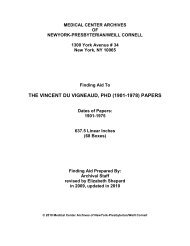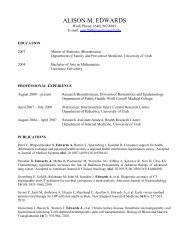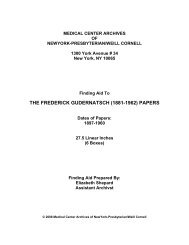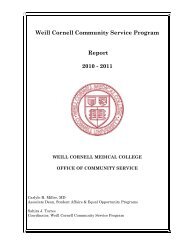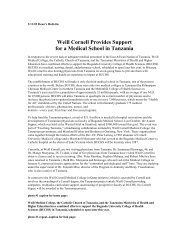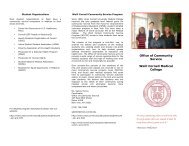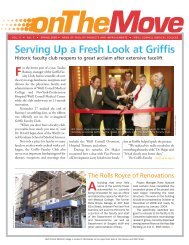Weillcornellmedicine - Weill Medical College - Cornell University
Weillcornellmedicine - Weill Medical College - Cornell University
Weillcornellmedicine - Weill Medical College - Cornell University
You also want an ePaper? Increase the reach of your titles
YUMPU automatically turns print PDFs into web optimized ePapers that Google loves.
TIP OF THE CAP TO...<br />
John Boockvar, MD, associate professor of neurological surgery, awarded a five-year, $650,000 grant<br />
from the National Institutes of Health for his work on brain tumor stem cells.<br />
Barry Hartman, MD, Ira Jacobson, MD, Mark Pasmantier, MD, and Richard Roberts, MD, winners of<br />
WCMC Alumni Association Honorary Fellowship Awards, which honor non-alumni medical professionals<br />
who have enriched the life of <strong>Weill</strong> <strong>Cornell</strong>, its faculty, and students.<br />
Nathaniel Hupert, MD, associate professor of public health and medicine, named director of the<br />
Preparedness Modeling Unit at the Centers for Disease Control and Prevention.<br />
Costantino Iadecola, MD, professor of neurology and neuroscience and chief of the Division of<br />
Neurobiology, winner of the Willis Lecture Award from the American Stroke Association.<br />
Mae Jemison, MD ’81, winner of the Eminent Black Chemical Engineer Award from the American<br />
Institute of Chemical Engineers.<br />
MD-PhD candidate Sandeep Kishore, awarded a Soros Fellowship for New Americans.<br />
Ophthalmology professor Harvey Lincoff, MD, honored by the American Academy of<br />
Ophthalmology as the first Schepens Lecturer, named for the father of modern retinal surgery.<br />
Microbiology and immunology professors Anne Moscona, MD, and Carl Nathan, MD, recipients of<br />
$100,000 Grand Challenges Explorations Grants from the Bill & Melinda Gates Foundation, to support<br />
innovative research projects in global health.<br />
Herbert Pardes, MD, president and CEO of NewYork-Presbyterian Hospital, honored by the New<br />
York Academy of Sciences for his leadership in making New York City a center of scientific excellence.<br />
FROM THE BENCH<br />
Nutrition and Brain Injury<br />
In the largest study ever to look at the effects of<br />
nutrition after traumatic brain injury, <strong>Weill</strong> <strong>Cornell</strong><br />
researchers have concluded that proper nutrition<br />
increases patients’ chances of survival. “For a long<br />
time, clinicians thought that intravenous fluids were<br />
enough—based on anecdotal situations and some<br />
basic biochemical knowledge—but we now know<br />
that this level of care is not meeting the actual<br />
requirement the body needs to repair itself following<br />
extreme trauma,” says neurological surgeon<br />
Roger Härtl, MD, the study’s lead author. From 2000<br />
to 2006, the study monitored 797 patients and<br />
observed that the sooner they received feeding<br />
tubes, and the higher their caloric intake, the more<br />
likely they were to survive. The findings, which were<br />
published in the Journal of Neurosurgery, will be<br />
incorporated into the handbook Guidelines for<br />
Management of Severe Traumatic Brain Injury.<br />
Drugs May Cause Fractures<br />
Long-term use of bisphosphonates—drugs, like<br />
Fosamax, used to treat osteoporosis and prevent<br />
fractures—may actually raise the risk of stress fractures<br />
by inhibiting the body’s ability to heal, says<br />
preliminary research at NewYork-Presbyterian<br />
Hospital/<strong>Weill</strong> <strong>Cornell</strong> <strong>Medical</strong> Center. Published in<br />
the Journal of Orthopaedic Trauma, the study followed<br />
seventy patients, twenty-five of whom had<br />
been taking Fosamax for an average of five years.<br />
Nineteen of those taking the drug had femoral<br />
stress fractures while only one of the other fortyfive<br />
people sustained the same injury. Furthermore,<br />
longer use of Fosamax seems to increase the risk—<br />
of those taking the drug, the patients with fractures<br />
had been using Fosamax for an average of 6.9<br />
years, compared with 2.5 years for those who were<br />
fracture-free. “While more research is necessary to<br />
confirm our results, physicians prescribing bisphosphonates<br />
for longer durations should monitor<br />
patients for indications of bone regeneration,” says<br />
orthopaedic surgeon Joseph Lane, MD.<br />
Hypertension Gender Gap<br />
Cardiovascular disease is the leading cause of death<br />
in both men and women in the U.S.—but females<br />
tend be at greater risk later in life. A recent <strong>Weill</strong><br />
<strong>Cornell</strong> study may explain why. Researchers focused<br />
on patients who had been taking the blood-pressure<br />
drugs losartan and atenolol for five years or more.<br />
In that time, men and women saw a similar reduction<br />
in overall blood pressure, but in women there<br />
was little change in left-ventricular hypertrophy, a<br />
Costantino Iadecola, MD<br />
Mae Jemison, MD ’81<br />
dangerous thickening and enlargement of the left<br />
ventricle. The findings, says lead author and medicine<br />
professor Peter Okin, MD ’80, “clearly show<br />
that men and women do not respond the same to<br />
hypertension drugs.” The study was published with<br />
an accompanying editorial in Hypertension.<br />
Gains in Crohn’s Treatment<br />
Improvements in Crohn’s disease surgeries are<br />
allowing patients to live longer, healthier lives, says<br />
a “state of the science” review by <strong>Weill</strong> <strong>Cornell</strong><br />
researchers published in Practical Gastroenterology<br />
in November. The disease, which triggers inflammation<br />
along the gastrointestinal tract, often has<br />
severe complications that require surgery. “In the<br />
past, this was limited to complex, invasive surgeries<br />
that required the removal of whole sections of the<br />
affected bowel,” says assistant professor of surgery<br />
and co-author Sharon Stein, MD. “But over the past<br />
two decades, advances in surgery have changed<br />
that paradigm.” Minimally invasive techniques such<br />
as laparoscopic surgery, strictureplasty, and fistula<br />
plugs not only spare tissue but also improve quality<br />
of life. “We’re learning that we can do so much<br />
more than we thought we could—reducing surgical<br />
risks, sparing bowel, and helping patients have better<br />
outcomes,” says surgery chairman Fabrizio<br />
Michelassi, MD, the study’s senior author.<br />
WINTER 2008/09 11<br />
ABBOTT<br />
CORNELL UP



